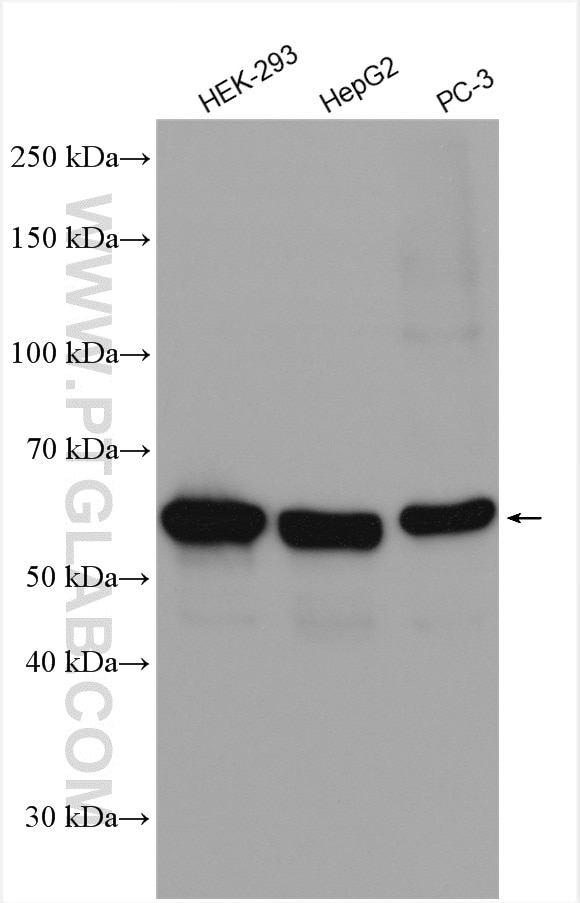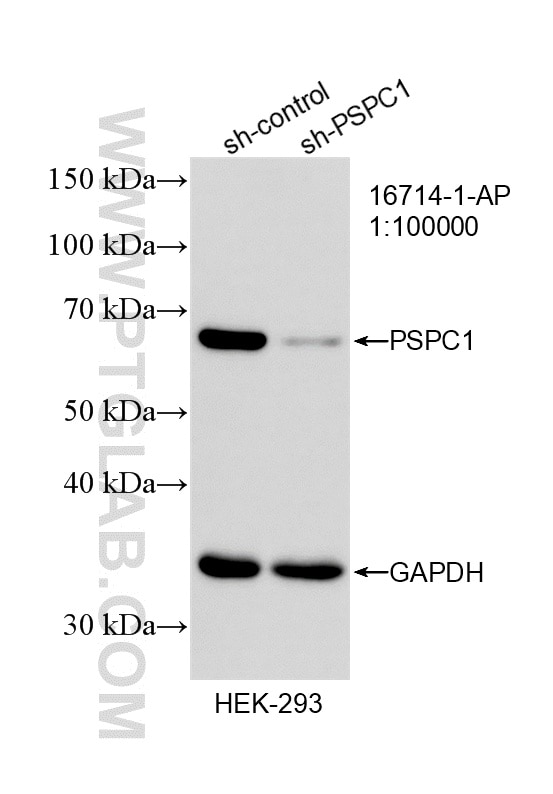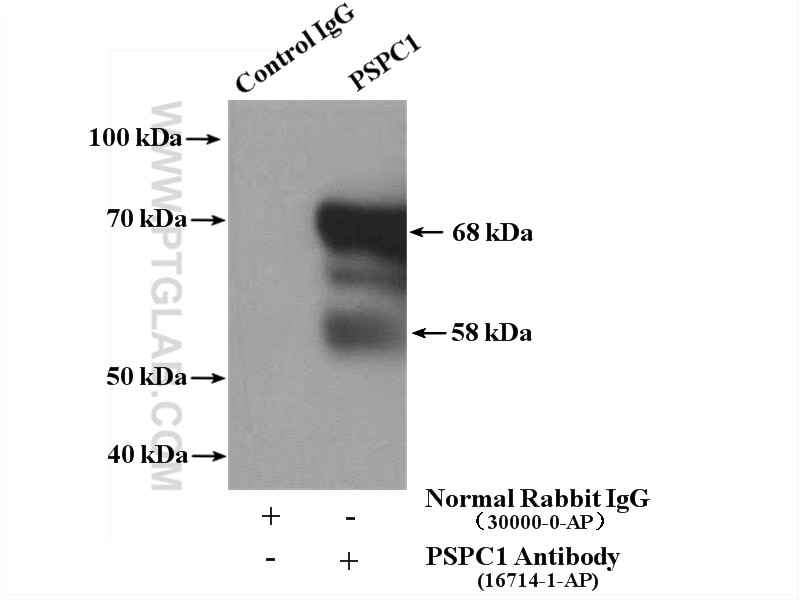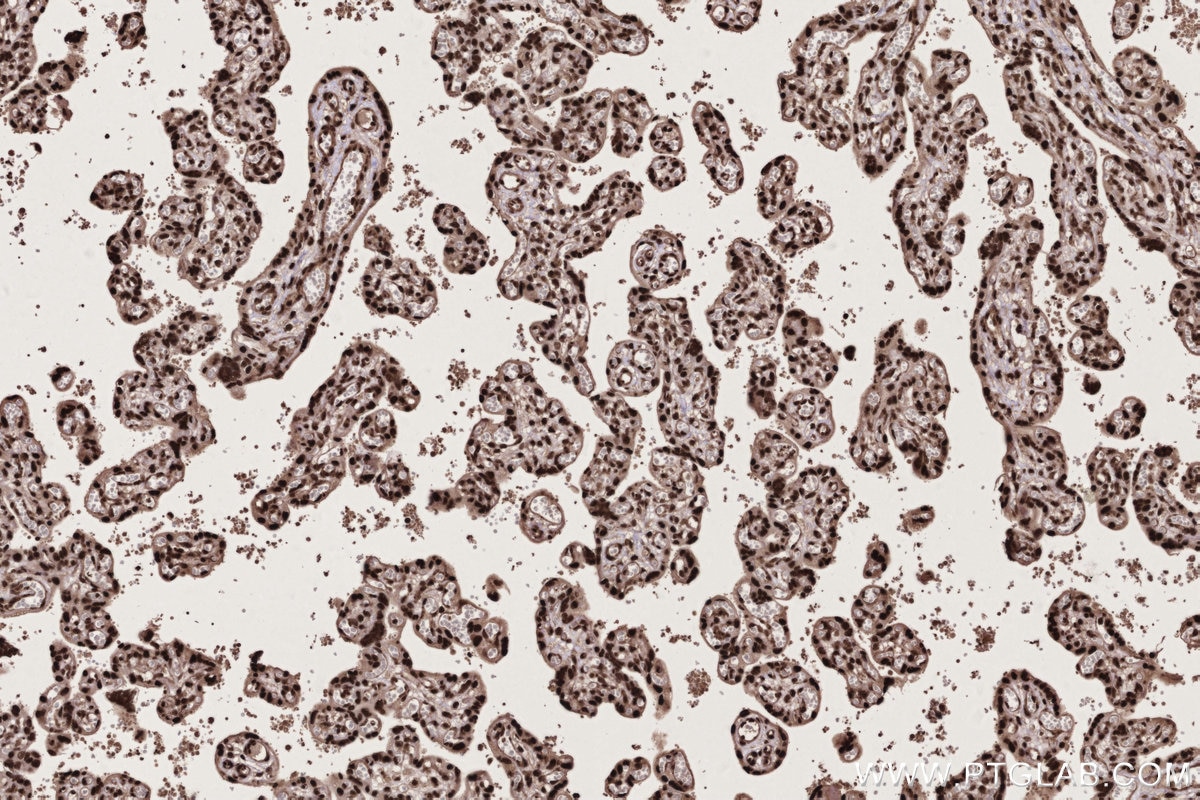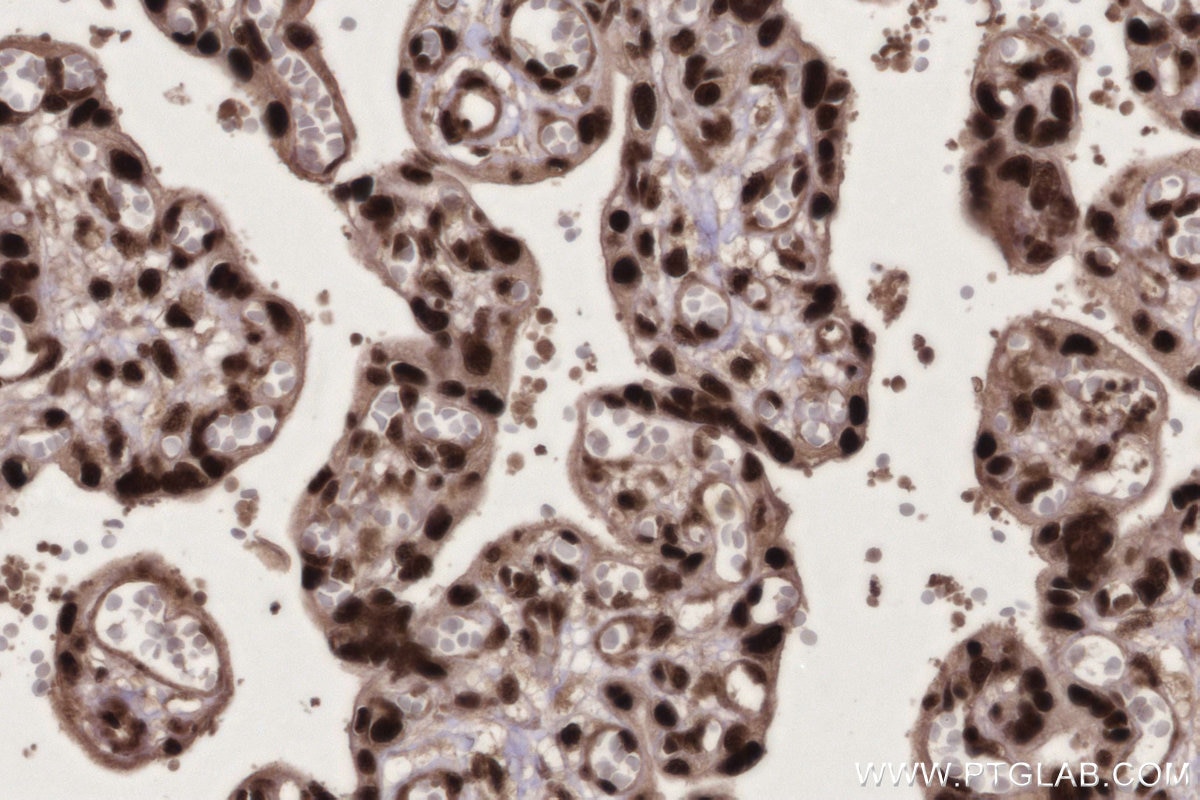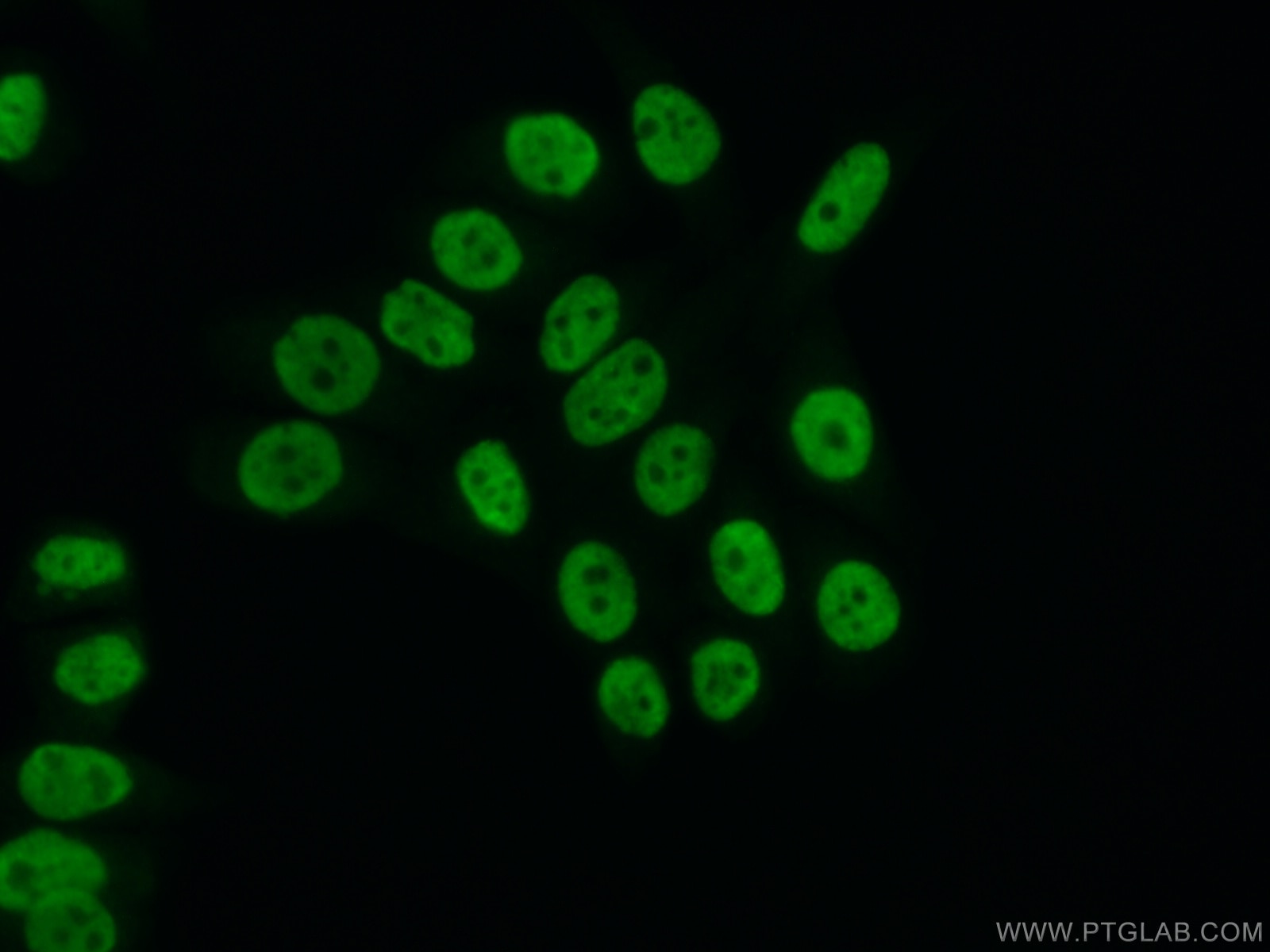Tested Applications
| Positive WB detected in | HEK-293 cells, HepG2 cells, PC-3 cells |
| Positive IP detected in | HEK-293 cells |
| Positive IHC detected in | human placenta tissue Note: suggested antigen retrieval with TE buffer pH 9.0; (*) Alternatively, antigen retrieval may be performed with citrate buffer pH 6.0 |
| Positive IF/ICC detected in | PC-3 cells |
Recommended dilution
| Application | Dilution |
|---|---|
| Western Blot (WB) | WB : 1:5000-1:50000 |
| Immunoprecipitation (IP) | IP : 0.5-4.0 ug for 1.0-3.0 mg of total protein lysate |
| Immunohistochemistry (IHC) | IHC : 1:250-1:1000 |
| Immunofluorescence (IF)/ICC | IF/ICC : 1:50-1:500 |
| It is recommended that this reagent should be titrated in each testing system to obtain optimal results. | |
| Sample-dependent, Check data in validation data gallery. | |
Published Applications
| KD/KO | See 1 publications below |
| WB | See 9 publications below |
| IF | See 3 publications below |
| RIP | See 1 publications below |
Product Information
16714-1-AP targets PSPC1 in WB, IHC, IF/ICC, IP, RIP, ELISA applications and shows reactivity with human, mouse, rat samples.
| Tested Reactivity | human, mouse, rat |
| Cited Reactivity | human, mouse |
| Host / Isotype | Rabbit / IgG |
| Class | Polyclonal |
| Type | Antibody |
| Immunogen |
CatNo: Ag10136 Product name: Recombinant human PSPC1 protein Source: e coli.-derived, PGEX-4T Tag: GST Domain: 1-351 aa of BC014184 Sequence: MMLRGNLKQVRIEKNPARLRALESAVGESEPAAAAAMALALAGEPAPPAPAPPEDHPDEEMGFTIDIKSFLKPGEKTYTQRCRLFVGNLPTDITEEDFKRLFERYGEPSEVFINRDRGFGFIRLESRTLAEIAKAELDGTILKSRPLRIRFATHGAALTVKNLSPVVSNELLEQAFSQFGPVEKAVVVVDDRGRATGKGFVEFAAKPPARKALERCGDGAFLLTTTPRPVIVEPMEQFDDEDGLPEKLMQKTQQYHKEREQPPRFAQPGTFEFEYASRWKALDEMEKQQREQVDRNIREAKEKLEAEMEAARHEHQLMLMRQDLMRRQEELRRLEELRNQELQKRKQIQLR Predict reactive species |
| Full Name | paraspeckle component 1 |
| Calculated Molecular Weight | 523 aa, 59 kDa |
| Observed Molecular Weight | 66 kDa |
| GenBank Accession Number | BC014184 |
| Gene Symbol | PSPC1 |
| Gene ID (NCBI) | 55269 |
| RRID | AB_2878302 |
| Conjugate | Unconjugated |
| Form | Liquid |
| Purification Method | Antigen affinity purification |
| UNIPROT ID | Q8WXF1 |
| Storage Buffer | PBS with 0.02% sodium azide and 50% glycerol, pH 7.3. |
| Storage Conditions | Store at -20°C. Stable for one year after shipment. Aliquoting is unnecessary for -20oC storage. 20ul sizes contain 0.1% BSA. |
Background Information
PSPC1 (paraspeckle component 1), a known paraspeckle biomarker, is a putative transcription factor that belongs to the Drosophila behavior/human splicing (DBHS) family. PSPC1 was recently identified as a contextual determinant of tumor progression in multiple cancer types involving oncogenic reprogramming to switch proapoptotic TGF-β to prometastatic TGF-β via hijacking of Smad2/3 targeting. Upregulated PSPC1 is correlated with advanced tumor stages and poor survival of patients with breast, lung, and liver cancers. Upregulated PSPC1 potentiates expression of mesenchymal markers, EMT transcription factors (EMT-TF), cancer stem-like cell transcription factors (CSC-TF), and c-Myc-related proliferation genes, thus promoting migration, invasion, spheroid formation, tumor formation, and metastasis.
Protocols
| Product Specific Protocols | |
|---|---|
| IF protocol for PSPC1 antibody 16714-1-AP | Download protocol |
| IHC protocol for PSPC1 antibody 16714-1-AP | Download protocol |
| IP protocol for PSPC1 antibody 16714-1-AP | Download protocol |
| WB protocol for PSPC1 antibody 16714-1-AP | Download protocol |
| Standard Protocols | |
|---|---|
| Click here to view our Standard Protocols |
Publications
| Species | Application | Title |
|---|---|---|
Drug Resist Updat Cell membrane-camouflaged bufalin targets NOD2 and overcomes multidrug resistance in pancreatic cancer | ||
Nat Commun K235 acetylation couples with PSPC1 to regulate the m6A demethylation activity of ALKBH5 and tumorigenesis | ||
Nucleic Acids Res mRNAs are sorted for export or degradation before passing through nuclear speckles. | ||
Cancer Lett SKP2 promotes the metastasis of pancreatic ductal adenocarcinoma by suppressing TRIM21-mediated PSPC1 degradation | ||
Int J Mol Sci The Interactions of the 70 kDa Fragment of Cell Adhesion Molecule L1 with Topoisomerase 1, Peroxisome Proliferator-Activated Receptor γ and NADH Dehydrogenase (Ubiquinone) Flavoprotein 2 Are Involved in Gene Expression and Neuronal L1-Dependent Functions | ||
J Biol Chem The disordered C terminus of ALKBH5 promotes phase separation and paraspeckles assembly |

